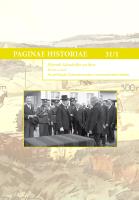Zákon pro klerikální udavače? Zákon na ochranu republiky očima autorů časopisu Volná myšlenka v době svého přijetí
A law for clerical police informers? The Law for the Protection of the Republic through the Eyes of the Authors of the Volná myšlenka (Free Thought) Magazine at the Time of its Adoption
Author(s): Jan KoberSubject(s): History, Law, Constitution, Jurisprudence, History of Law, Interwar Period (1920 - 1939)
Published by: Národní archiv
Keywords: laws; criminal law; state repression; free thought (movement); atheism; press
Summary/Abstract: The article introduces readers to a little-known chapter in the history of restric tions on freedom of expression. Using the example of the magazine Volná myšlenka (Free Thought), the main organ of the largest Atheist association in the interwar, Free Czechoslovak Thought (Volná myšlenka československá), a large structure with about twenty thousand members at the time and a hundreds of local associations, it shows the varying range of cautious and even harshly critical reactions of the maga zine’s authors to the highly controversial 1923 draft law for the protection of the republic. The authors of Free Thought initially maintained a certain reticence to wards the bill, but later increasingly viewed the bill and its rubbery formulations as dangerous not only to the interests of the Atheists but also to society as a whole. In relation to the adoption of the law itself, the magazine then gave space to some of its politically active members who subjected the bill to harsh criticism in the Chamber of Deputies and the Senate. This criticism of the draft bill for enabling potentially wide range of perse cution grew into a criticism of the decline of Czechoslovak parliamentarism, in which the committees, unforeseen by the constitutional charter, as well as politi cal parties were able to pressure deputies and senators, “relegated to mere voting instruments, swinging robots”, to a large extent to control the work of committees and decision-making in the chamber. This model was judged undemocratic by critical freethinkers, who considered it an oligarchy. They feared that the Law for the Protection of the Republic would be abused not only to persecute nonreligious critics of religion, but also to persecute and intimidate critics of the decline of Czechoslovak parliamentarism as well as the public criticism of powerful politi cians, power groups and of political parties.. The non-religious perspective, which measured the public space primarily by the danger of religious authoritarianism and unfreedom, understood democracy as a valuable system to protect the free dom of the individual and society as a whole. Critical thinking, questioning, and public debate were to be a way to find appropriate solutions to social and political issues in governance. The Protection of the Republic Act, according to the authors of Free Thought, allowed to paralyze criticism, questioning and public debate and therefore posed in their eyes not only a threat to the Atheists or to the Czechoslovak society as a whole, but also to democracy itself.
Journal: Paginae Historiae
- Issue Year: 31/2023
- Issue No: 1
- Page Range: 423-443
- Page Count: 21
- Language: Czech

